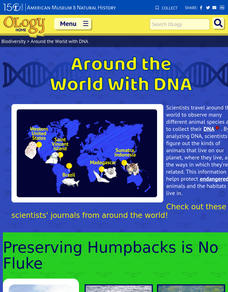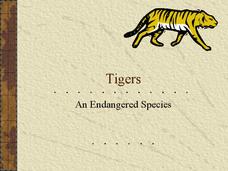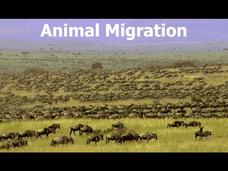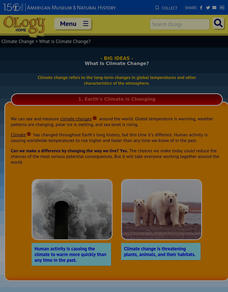American Museum of Natural History
Around with World with DNA
A mammalogist, ornithologist, ichthyologist, and a conservation geneticist share their work and their hopes that their research will help protect and save endangered species and their habitats.
National Wildlife Federation
Massive Migrations
Turn your students into flocks of migratory birds for this fun lesson plan on animal migration. Prior to the activity, the teacher creates four different migration routes in the classroom or any available open space, labeling nesting...
Curated OER
Tigers: An Endangered Species
Facts about tigers are packed into a PowerPoint presentation about tigers. The presentation includes great photographs and accompanying text regarding the habitats, diet, lifespan, and physical attributes of tigers. Very interesting!
Outside Education
Who Lives in a Tree?
Young scientists journey outside to observe what animals live in nearby tress. They identify the animal, take note of special features that help the animal in this habitat, and then illustrate their findings.
PBS
Reading Adventure Pack: Oceans
Flotsam by David Wiesner and The Magic School Bus on the Ocean Floor by Joanna Cole, illustrated by Bruce Degen, begin a reading adventure pack focusing on oceans. With story listening and thoughtful discussion, scholars complete several...
Science Matters
That’s An Otter Story
Young scientists discover how sea otters' habitats have changed due to human impact. Through conversation, video observation, and story reading, scholars identify how human interactions change a specific ecosystem in both positive and...
Houghton Mifflin Harcourt
Animal Adventures: Challenge Activities (Theme 6)
Challenge learners who have mastered the basic concepts in the Houghton Mifflin Harcourt thematic units on animal adventures with the activities and exercises suggested in this packet packed with ideas.
University of Washington
Animal Migration
Here is a unique resource to use with middle and high schoolers that deals with animal migration. Viewers discover the reasons for, types of, and animals that practice this behavioral adaptation. Specific animals that are introduced...
Columbus City Schools
Get Your Organisms Organized
From large to small, show your class how to organize them all! Included within the guide is everything you need to take their knowledge of classification from the cellular to the species level. The worksheets focus on building vocabulary...
American Museum of Natural History
The Legend of the Flying Frog
Young conservation biologists have an opportunity to get involved in the effort to save endangered species. After reading and illustrating the tale of the Flying Frog, they craft a tale about another fictional endangered species.
American Museum of Natural History
Bio-Benefits
Kick-start a discussion of the importance of biodiversity with a colorful resource that touts the benefits of maintaining healthy ecosystems. The images stress the interdependence of all the elements of an ecosystem.
American Museum of Natural History
Going, Going...Gone?
Young environmentalists consider how scientists are attempting to save endangered species. They read about what causes extinction and steps to take to minimize the threats.
American Museum of Natural History
They Glow!
Let there be light! An interactive online lesson describes the process of bioluminescence and how ocean species use it to their advantage. The lesson highlights several specific species as well as provides vocabulary support with...
American Museum of Natural History
What is Marine Biology?
A marine environment covers the majority of the earth but is arguably the least understood. Teach young scientists about the characteristics of oceans and ocean species using an interactive online lesson. The in-person or remote learning...
National Geographic
Eat an Alien Invader
If you are looking for a lesson plan about invasive species to ocean habitats, you have arrived! Introduce the concept to learners and have them read an article about marine invasive species. Vocabulary, relevant web links, and a cute...
Core Knowledge Foundation
Ecology Tell It Again!™ Read-Aloud Anthology
A read-aloud anthology provides informational texts about ecology to boost reading comprehension. Third-graders listen and discuss readings where they answer questions and focus on vocabulary. Pupils complete extension activities,...
National Wildlife Federation
Massive Migrations: Grades K-4
Bird migration is a fascinating behavior. Budding scientists experience their own migrations using the school grounds for their flight patterns. They follow a map that leads them through a migration pattern that includes stops for...
EngageNY
Asking and Answering Questions: Reading about a Frog's Habitat
Building upon previous lessons, scholars take to asking and answering questions about a frog's habitat. A partner discussion follows a read-aloud of an informational text in preparation for a worksheet that boosts reading comprehension...
American Museum of Natural History
What's the Big Deal About Water?
It may seem simple, but water is one of the most unique substances on Earth. An interactive online lesson describes its properties and importance in so many different situations. Learners interact with the lesson to learn the role water...
National Park Service
Living & Non-Living Interactions
What better way to learn about ecosystems than by getting outside and observing them first hand? Accompanying a field trip to a local park or outdoor space, this series of collaborative activities engages children in learning about the...
American Museum of Natural History
What Is Climate Change?
So many factors show that climate change has arrived. Learners read through an online resource that explains the data and the consequences of climate change. They also review strategies for slowing or even reversing the global influence.
Michigan State University
May I Take Your Order?
If you're a pest, come and get a tasty meal here! Scholars work collaboratively to construct a mini restaurant out of a shoe box and create a menu that feeds a pest their favorite food.
Other popular searches
- Animals and Their Habitats
- Zoo Animals Habitats
- Animals and Habitats
- Animals Habitats
- Animals and Animal Homes
- Matching Habitats With Animals
- Swamp Animals Habitats
- Pet Animals Habitats
- Educational Animals Habitats
- Farm Animals Habitats
- Forest Animals Habitats
- Matching Animals and Habitats























